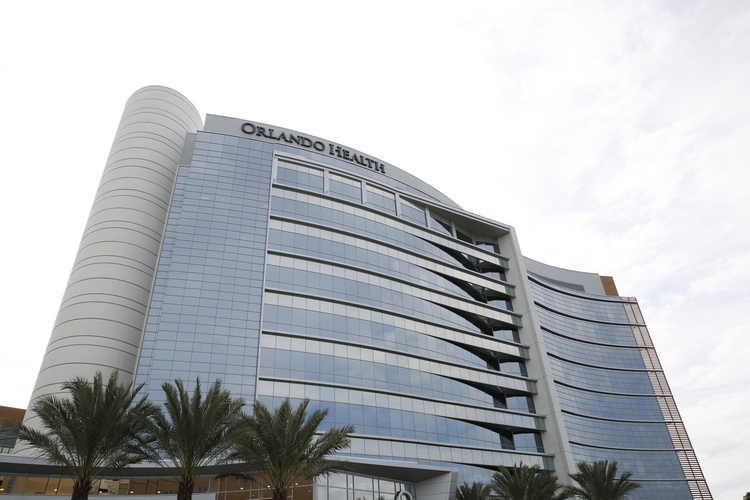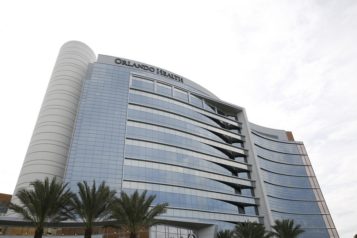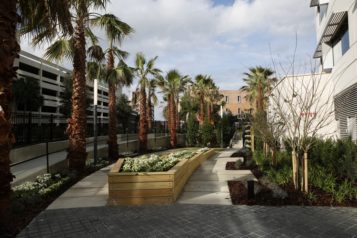
ORLANDO, Fla. — Orlando Health turns the page to a new chapter in patient, guest and team member experience, with the opening of Orlando Regional Medical Center’s new patient tower.
The new patient tower is referred to as ORMC North Tower. The existing ORMC building will now be referred to as ORMC South Tower.
The 245-bed, 10-story, 345,000-square foot north tower is designed to enhance the quality of care, reinforce safety for patients and caregivers and heighten patient satisfaction. It features all-private rooms, centralized registration, in-room computers to enable caregivers to chart at patients” bedside, safety “red lines” integrated into acute-care rooms to identify isolation boundaries and a host of concierge-style amenities—all nestled in a building that reflects the natural beauty of Florida—blending medicine and art for a unique healing environment.
The north tower is part of the hospital’s redesign and renovation project. The project includes an expanded state-of-the-art emergency department, cardiovascular service areas, operating suites and other ancillary services located inside ORMC South Tower. The south tower expansion is expected to be complete in the spring. The entire redesign and renovation project, an estimated cost of $297 million, represents one of the largest and most significant projects in the organization’s history.
Brasfield & Gorrie served as the general contractor for the project. The architectural firm was HKS Architects, Inc.
Redefining the patient experience
“The north tower represents a transformation in our healthcare story that redefines how we care for our patients,” said Mark A. Jones, president, ORMC. “One advantage of the new patient tower is that we will be converting all of ORMC to a private room facility, which allows patients to rest better, feel more at ease and have more privacy as they recover with loved ones nearby. Also, more efficiently designed advanced patient care units bring clinicians and technology closer to patients and families for improved interaction and medical care delivery.”
The north tower is a culmination of input and feedback from patients, their families and team members, along with industry best practices, to form an atmosphere designed to enhance wellness, and take the Orlando Health patient experience to the next level.
Designed with home, hospitality and nature in mind
The enhanced patient experience continues with distinctive and purposeful design elements to support the healing environment with touches of the home environment, hospitality and nature.
“Our interior design is both Florida inspired and nature inspired,” said Karen Guindi, interior designer, and facilities planning senior project manager, business development, Orlando Health. “We know from countless studies the ways nature helps in healing, and this is a place of healing.”
Nature’s elements are captured in many aspects to bring calm and harmony. The curve of the building symbolizes the waves of water. Suspended sphere lighting in the atrium allude to bubbles formed in water. Light passes through expansive windows and glass walls keeping the environment bright and airy.
Artwork by Florida and local artists along the walls continues to tell the story of nature with images that depict ocean blues, warm earth tones and textures of stones and woods. Orchids and other live plants placed throughout help improve health and well-being.
“A place of healing can also be a place of beautiful surroundings,” said Guindi. “Breathtaking views of a sunrise or a sunset as you begin to feel better after heart surgery, or views of Orlando’s downtown skyline as you begin to take your first steps after a hip replacement, add to the healing process.”
The environment also embraces families and team members.
“For families and guests, a landscape view from a retreat room helps with relaxation as they rest and rejuvenate to help care for and support loved ones in their recovery,” said Guindi. “We even have staff respite areas to provide a place of tranquility for a needed pause or moment in a day to help maintain balance.”
Other design elements promote movement. Flooring patterns of different textures and designs create direction and aid in guidance as guests and patients make their way throughout spaces. Also, each floor has a unique color palette, which serves as location reminder cues.
The new facility design also includes green building strategies to lower operating costs, reduce energy use and increase building efficiency. Strategies include natural durable materials and light filtering through the building to maximize natural light and reduce the need for artificial lighting.






 Join our thriving community of 70,000+ superintendents and trade professionals on LinkedIn!
Join our thriving community of 70,000+ superintendents and trade professionals on LinkedIn! Search our job board for your next opportunity, or post an opening within your company.
Search our job board for your next opportunity, or post an opening within your company. Subscribe to our monthly
Construction Superintendent eNewsletter and stay current.
Subscribe to our monthly
Construction Superintendent eNewsletter and stay current.